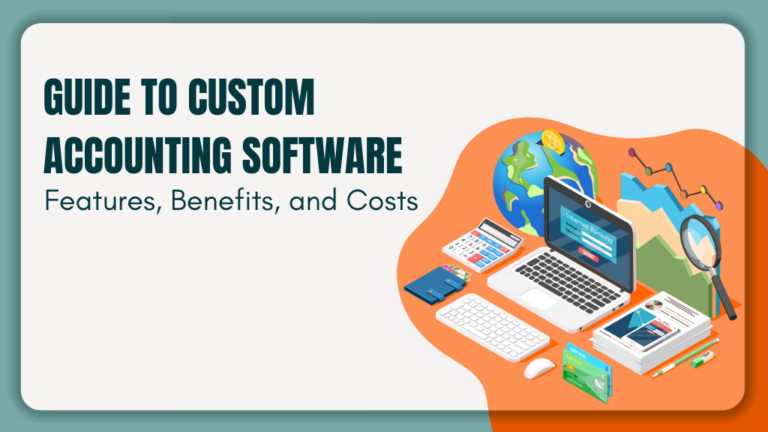
Contents
In the ever-evolving business landscape, efficient financial management is paramount to success. Gone are the days of cumbersome manual accounting processes and error-prone spreadsheets. Today, accounting software has emerged as a game-changer, offering a comprehensive suite of features and benefits that revolutionize the way businesses handle their financial operations. From streamlining bookkeeping tasks to providing real-time insights and ensuring compliance, these powerful tools have become indispensable for organizations of all sizes. now let’s explore about the Features of Accounting Software & its Benefits.
Robust Features for Streamlined Accounting Processes
Accounting software is designed to automate and simplify a wide range of financial tasks, empowering businesses to operate with greater efficiency and accuracy. Here are some of the key features that make these solutions invaluable:
Seamless Data Entry and Transaction Recording
At the heart of accounting software lies the ability to easily record and categorize financial transactions. Whether it’s invoicing, expense tracking, or bank reconciliations, these tools provide user-friendly interfaces and automated data entry mechanisms, reducing the risk of human error and saving valuable time.
Comprehensive Reporting and Real-Time Visibility
Generating accurate and insightful financial reports is a breeze with accounting software. From balance sheets and income statements to cash flow reports and budget analyses, these solutions offer a wealth of customizable reporting options. Additionally, real-time data visibility allows businesses to monitor their financial performance and make informed decisions on the fly.
Inventory Management and Tracking
For businesses that deal with physical products, accounting software often includes robust inventory management capabilities. These features enable businesses to track stock levels, manage orders, and monitor inventory movements, ensuring optimal inventory levels and minimizing stockouts or overstocking.
Payroll and Tax Compliance
Keeping up with ever-changing payroll regulations and tax laws can be a daunting task. Fortunately, many accounting software solutions offer integrated payroll and tax management modules, streamlining processes like payroll calculations, tax filings, and compliance reporting.
Project and Job Costing
For service-based businesses or those with complex project management needs, accounting software frequently includes project and job costing features. These tools allow businesses to track expenses, billable hours, and profitability on a per-project basis, ensuring accurate invoicing and resource allocation.
Multi-Currency and Multi-Company Support
As businesses expand globally or operate across multiple entities, accounting software provides multi-currency and multi-company support. This feature enables seamless financial management across different currencies and legal entities, ensuring compliance and accurate consolidated reporting.
Third-Party Integrations and Customization
Modern accounting software solutions often offer robust integration capabilities, allowing businesses to connect with other essential tools like customer relationship management (CRM) systems, e-commerce platforms, and productivity apps. Additionally, many solutions offer customization options, enabling businesses to tailor the software to their specific needs and workflows.
Game-Changing Benefits for Businesses
Beyond the powerful features, accounting software delivers a myriad of benefits that can significantly impact a business’s bottom line and overall success. Here are some of the key advantages of embracing these innovative solutions:
Enhanced Efficiency and Productivity
By automating time-consuming tasks and streamlining processes, accounting software dramatically enhances efficiency and productivity. Businesses can reduce the time and resources dedicated to manual bookkeeping, allowing teams to focus on higher-value activities that drive growth and profitability.
Improved Accuracy and Data Integrity
Human error is a common challenge in manual accounting processes. However, with accounting software, businesses can minimize errors and ensure data integrity. Automated calculations, built-in validation checks, and centralized data storage reduce the risk of inaccuracies, leading to more reliable financial reporting and decision-making.
Real-Time Visibility and Informed Decision-Making
One of the most significant benefits of accounting software is the real-time visibility it provides into a business’s financial performance. With up-to-date data and customizable dashboards, businesses can monitor key metrics, identify trends, and make data-driven decisions that drive growth and mitigate risks.
Enhanced Compliance and Audit Readiness
Staying compliant with constantly evolving accounting standards, tax regulations, and industry-specific requirements can be a daunting task. Accounting software simplifies compliance by automating reporting processes, ensuring accurate record-keeping, and providing audit trails, minimizing the risk of penalties and fines.
Scalability and Future-Proofing
As businesses grow and their financial operations become more complex, accounting software offers the scalability and flexibility to adapt. From supporting multiple currencies and legal entities to handling increased transaction volumes, these solutions can grow with a business, ensuring a future-proof financial management system.
Improved Collaboration and Data Accessibility
Accounting software facilitates better collaboration and data accessibility across teams and departments. With centralized data storage and secure remote access, stakeholders can access real-time financial information, enabling seamless communication and informed decision-making.
Cost Savings and Return on Investment (ROI)
While implementing accounting software may require an initial investment, the long-term cost savings and return on investment (ROI) can be substantial. By streamlining processes, reducing errors, and enabling data-driven decision-making, businesses can optimize resource allocation, minimize inefficiencies, and drive profitability.
Unlocking the Full Potential: Choosing the Right Accounting Software
To fully harness the power of accounting software and reap its numerous benefits, businesses must carefully evaluate their specific needs and select the right solution. Factors to consider include business size, industry, scalability requirements, integration needs, and user-friendliness.
Additionally, it’s crucial to assess the software’s support and training resources, as well as the vendor’s reputation and long-term roadmap. Investing in a robust and reputable accounting software solution can be a game-changer for businesses, enabling them to streamline operations, ensure compliance, and drive growth through data-driven decision-making.
In the ever-competitive business landscape, embracing the robust features and game-changing benefits of accounting software is no longer an option but a necessity. By leveraging these powerful tools, businesses can gain a competitive edge, enhance efficiency, and position themselves for long-term success in an increasingly digital and data-driven world.